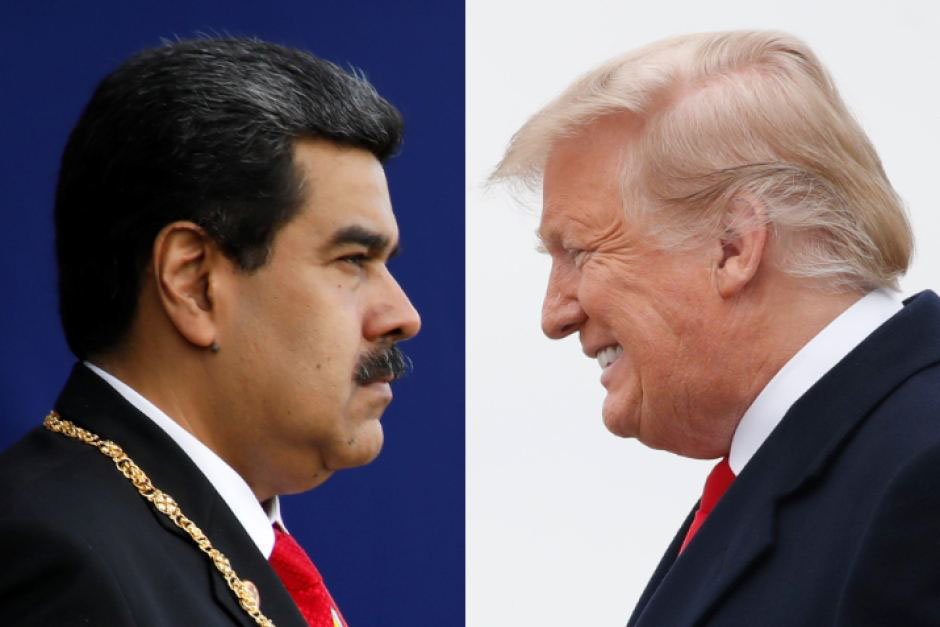Deploying one of his customary emotive speeches, United States President Donald Trump, on September 25th, unleashed yet another salvo against the government of President Nicholas Maduro in Venezuela, restating what he says is Washington’s commitment to correcting the “tragedy of historic proportions” that exists in Venezuela.
In the process the US President itemised the considerable list of sanctions which Washington has already imposed on the Maduro administration over the past year, not least those preventing President Maduro and those who Trump describes as his “enablers” from accessing the US financial system.
Just last month, Trump issued an executive order which, in effect completely froze the assets of the Maduro government in the United States, which sanctions Trump said during his presentation, “have been tightly focussed on closing down every avenue” used by what Trump described as President Maduro’s “criminal and totalitarian rule.”
The symbolism in the stage set by the US President to unleash the latest of salvo against the Maduro administration was unmistakable. Not only did he elaborately acknowledge the presence at the forum of diplomats from Argentina, Brazil, Colombia, Chile, Ecuador and Peru, for what he described as their countries’ “leadership and assistance” in supporting Washington’s stand on the Maduro administration, but also the presence at the New York forum of two representatives of what he regards as “Venezuela’s legitimate interim government… Presidential Com-missioner for Foreign Affairs, Julio Borges and Venezuela’s Ambassador to the United States, Carlos Vecchio.”
All of this follows Washington’s January 2019 imposition of sanctions against Venezuela’s oil and gas industry, the life blood of the country’s economy, where sanctions were attended by a threat to other countries that choose to do anything to break the sanctions.
The exception to the sanctions targeting Venezuela’s oil industry, at least up until now, is the US oil company, Chevron Corporation, which, on account of the company’s economic interests, has been cleared by the US Treasury Department to continue to do business with Venezuela’s national oil company, PDVSA, until the end of October at which time and except there is radical political change in Venezuela, Washington is scheduled to ‘turn out the lights’ on the company’s relations with the country’s oil industry.
But it was not only Maduro that was targeted in President Trump’s New York speech. Asserting that “socialism has destroyed what was once among the most prosperous countries anywhere in the world,” the US President declared that Maduro had allowed “thousands of Cuban agents to infiltrate Venezuela’s security forces and other institutions,” and that, in effect, the Venezuelan President had “sold out his nation to a foreign dictatorship.”
While the focus of Trump’s speech centred on the crisis in Venezuela, there was a thinly-veiled wider message for the rest of the hemisphere in his undertaking that “the future of the Western Hemisphere will not be written by socialists and tyrants, but by liberty-loving patriots.” Contextually, he extended what he said was his administration’s support for “every suffering soul” in Cuba, Nicaragua, and Venezuela,” who he said “will finally know the blessings of democracy and the full glory of freedom.”
In a speech that left no doubt that Washington, under the Trump administration, sees itself in a wider ideological battle with socialism in the hemisphere, Trump said of Venezuela that socialism had “destroyed what was once among the most prosperous countries anywhere in the world… Today, Venezuelans are starving and they’re dying from lack of medicine, doctors, help.” Trump says that “the most significant factor propping up the Venezue-lan regime is the communist dictatorship in Cuba. Maduro allows Cuba to plunder Venezuelans’ oil, raid its wealth, and rob its people. Venezuela’s oil is at a low point.”
A mid-September assessment of Venezuela’s oil industry saw output continuing to fall according to figures from the Organization of the Petroleum Exporting Countries (OPEC), the latest report suggesting that the country had produced 712,000 barrels per day (bpd) in August, down from 755,000 in July. PDVSA had reportedly declared figures of 933,000 bpd in August, up from 906,000 bpd in July. In 2017 and 2018, respectively, Venezuela’ oil production had averaged 1.911 and 1.354 million bpd, respectively.





